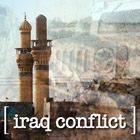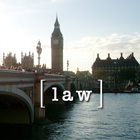
|
SADDAM DECRIES TRIAL PROCESS, QUESTIONS AUTHORITY OF JUDGE, REFUSES TO ID HIMSELF
19 October 2005 At the opening of his trial, Saddam Hussein, charged with ordering the killing of 143 Shi'a —presumably opponents to his rule— in 1982, was defiant. He decried the judicial process set up to judge him as illegitimate, questioned the authority of the judge overseeing the proceedings, and refused to acknowledge his identity. Though the particular incidents to which the charges in this trial make reference were not among the leading reasons for the invasion which deposed the Ba'athist dictator, this is said to be only the first trial, with other crimes against Iraqis and Iraq's neighbors likely to be dealt with in subsequent proceedings. The reason for this separation of the proceedings is ostensibly to guarantee both a hearing to those he is alleged to have victimized and to increase the likelihood of conviction. Hussein entered the courtroom reportedly carrying a copy of the Quran. When asked to identify himself, he retorted "Who are you? What does this court want? Have you ever been a judge before?" according to BBC reports. He claimed to retain his "constitutional rights as president of Iraq" and referred to the proceedings as "aggression". He reportedly added "What is based on injustice is unjust ... I do not respond to this so-called court, with all due respect." He is not being tried alone, but stands with codefendants accused in the political/ethnic killings of Shi'a Iraqis. Other defendants were said to be as defiant as the former Iraqi ruler. It is expected the prosecutors will seek charges for the mass murder of 5,000 Kurdish Iraqis in the village of Halabja in 1988, when Hussein's government released deadly gas over the entire village. Iranian families have criticized the process for not looking into the use of chemical weapons against hundreds of thousands of Iranian soldiers in the Iran-Iraq war and against civilian populations in Iran. Human Rights Watch, for its part, has warned the special tribunal set up to try Hussein and his deputies "runs the risk of violating international standards for fair trials". The BBC reports "Amnesty International has sent three delegates to Baghdad to ensure Saddam Hussein receives a fair trial, and to oppose the death penalty if he is found guilty." [For more: BBC]
TRIAL FORUM FOR HUSSEIN AT ISSUE Even after granting Saddam Hussein POW status, the Occupying authorities say Iraqis will try their ousted dictator. The Geneva Conventions, however, specifically indicate that in the interests of justice, POW's can only be tried by an international tribunal or by occupying forces responsible for overseeing a transition to legitimate government. [For more: Salon] 400 WEAPONS INSPECTORS TO QUIT IRAQ Some 400 weapons experts and search specialists are to be leaving Iraq, though an inspection force does remain, including specialists in the disposal of chemical and biological agents. A Washington Post report noted that there was intelligence to indicate that Iraq may have destroyed its stockpiles as early as 1991. The New York Times also reported that a pattern of deceit within the weapons programs themselves may be responsible for inflated expectations on the part of outside observers... [For more: FT] |
||||||||||
|
|||||||||||







